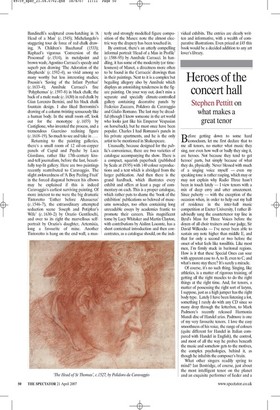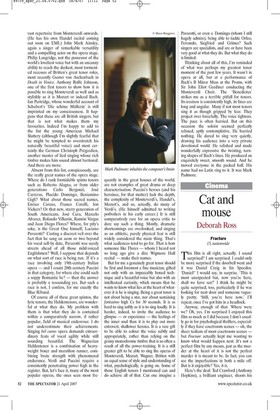Heroes of the concert hall
Stephen Pettitt on what makes a great tenor
Before getting down to some hard iconoclasm, let me first declare that to me all tenors, no matter what music they sing, nor even how well or badly they sing it, are heroes. Not because they tend to get heroes’ parts, but simply because of what they do, physically. Never blessed with much of a singing voice myself — even my speaking tone is rather rasping, which may or may not explain why Radio Three hasn’t been in touch lately — I view tenors with a mix of deep envy and utter amazement. Since puberty — with the exception of the occasion when, in order to help out my hall of residence in the inter-hall music competition at Exeter University, I rather illadvisedly sang the countertenor top line in Byrd’s Mass for Three Voices before the doyen of all choir trainers and our judge, Sir David Willcocks — I’ve never been able to sustain any note higher than middle E, and that for only a second or two before the onset of what feels like tonsillitis. Like most men, I’m firmly stuck in baritonal regions. How is it that these Special Ones can soar with apparent ease to A, to B, even to C, and what’s more stay there? It’s surely a miracle.
Of course, it’s no such thing. Singing, like athletics, is a matter of rigorous training, of getting all the right muscles to do the right things at the right time. And, for tenors, a matter of possessing the right sort of larynx, I suppose, just as a high jumper has the right body type. Lately I have been listening a lot, something I rarely do with any CD since so many drop through the letterbox, to Mark Padmore’s recently released Harmonia Mundi disc of Handel arias. Padmore is one of my very favourite tenors. I love the easy smoothness of his voice, the range of colours (quite different for Handel in Italian compared with Handel in English), the control, and most of all the way he probes beneath the music and somehow gets to the motives, the complex psychologies, behind it, as though he inhabits the composer’s brain.
What other singers readily spring to mind? Ian Bostridge, of course, just about the most intelligent tenor on the planet and an exquisite performer of lieder and a vast repertoire from Monteverdi onwards. (He has his own Handel recital coming out soon on EMI.) John Mark Ainsley, again a singer of remarkable versatility and a compelling actor on the opera stage. Philip Langridge, not the possessor of the world’s loveliest voice but with an uncanny ability to reach the darkest, most tormented recesses of Britten’s great tenor roles, most recently Gustav von Aschenbach in Death in Venice. Anthony Rolfe Johnson, one of the first tenors to show how it is possible to sing Monteverdi as well and as stylishly as it is Mozart or indeed Bach. Ian Partridge, whose wonderful account of Schubert’s ‘Die schöne Müllerin’ is still imprinted on my consciousness. It happens that these are all British singers, but that is not what makes them my favourites. Indeed I’m happy to add to the list the young American Michael Slattery (although I’m slightly fearful that he might be tempted to overstretch his naturally beautiful voice) and most certainly the German Christoph Prégardien, another master of lied singing whose rich timbre makes him sound almost baritonal. And there are more.
Absent from this list, conspicuously, are the really great names of the opera stage. Where do I rank formidable spinto tenors such as Roberto Alagna, or from older generations Carlo Bergonzi, José Carreras, Placido Domingo, Beniamino Gigli? What about those sacred names, Enrico Caruso, Franco Corelli, Jon Vickers? Or that new, starry generation of South Americans, José Cura, Marcelo Alvarez, Rolando Villazón, Ramón Vargas and Juan Diego Flores? Where, for pity’s sake, is the Great One himself, Luciano Pavarotti? Casting a discreet veil over the fact that he sang an aeon or two beyond his vocal sell-by date, Pavarotti was surely streets ahead of all those mild-voiced Englishmen? Well, I suppose that depends on what sort of race is being run. If it’s a race involving only 19th-century Italian opera — and I count 20th-century Puccini in that category, for where else could such a soppy Romantic be? — then the answer is probably a resounding yes. But such a race is not, I confess, for me exactly the Blue Riband.
Of course all of these great spintos, the lyric tenors, the Heldentenors, are wonderful at what they do. My problem with them is that what they do is contained within a comparatively narrow, if rather popular, field of musical endeavour. I do not underestimate their achievements. Singing bel canto opera demands extraordinary feats of vocal agility while still sounding beautiful. The Wagnerian Heldentenor is a combination of heavyweight boxer and marathon runner, combining brute strength with phenomenal endurance. Verdi and Puccini require a consistently penetrating power high in the register. But, let’s face it, many of the most popular operas, the ones seen most fre quently in the great houses of the world, are not examples of great drama or deep characterisation. Puccini’s heroes (and his heroines, for that matter) lack the depth, the complexity of Monteverdi’s, Handel’s, Mozart’s, and so, actually, do many of Verdi’s. (He himself admitted to writing potboilers in his early career.) It is still comparatively rare for an opera critic to dare say such a thing. Mostly, dramatic shortcomings are overlooked, and singing as an athletic, purely physical feat is still widely considered the main thing. That’s what audiences tend to go for. That is how someone like Flores — whom I heard not so long ago give a dire Wigmore Hall recital — make their names.
But for me a genuinely great tenor should be first and foremost a fine musician, gifted not only with an impeccably honed technique and a beautiful voice but also with an intellectual curiosity, which means that he wants to know what lies at the heart of whatever it is he is singing. Being a great tenor is not about being a star, nor about sustaining fortissimo high Cs for 30 seconds. It is as hard to sing softly as it is to sing loudly. It is harder, indeed, to invite the audience to glimpse — or experience — the feelings of the inner soul than it is to play out more extrovert, shallower heroics. It is a rare gift to be able to colour the voice subtly and appropriately, rather than relying on the grainy monochrome timbre that is so often a result of all the power-training. It is a still greater gift to be able to sing the operas of Monteverdi, Mozart, Wagner, Britten with an equal sense of style and understanding of what, psychologically, is going on. Some of those English tenors I mentioned can and do achieve all of that. Can one imagine a Pavarotti, or even a Domingo (whom I still hugely admire), being able to tackle Orfeo, Ferrando, Siegfried and Grimes? Such singers are specialists, and are or have been very good at what they do. But what they do is limited.
Thinking about all of this, I’m reminded of what was perhaps my greatest tenor moment of the past few years. It wasn’t in opera at all, but at a performance of Bach’s B Minor Mass at the Proms, with Sir John Eliot Gardiner conducting the Monteverdi Choir. The ‘Benedictus’ strikes me as a terrible pitfall for tenors. Its tessitura is consistently high, its lines are long and angular. Many if not most tenors sing it as though gripped by fear. They project over-forcefully. The voice tightens. The pace is often hurried. But on this occasion the soloist seemed perfectly relaxed, aptly contemplative. He hurried nothing. He dared to sing very quietly, drawing his audience into a very private devotional world. He relished and made wonderfully expressive the twisting, turning shapes of Bach’s lines. He produced an exquisitely sweet, smooth sound. And he moved everyone in the packed hall. His name had no Latin ring to it. It was Mark Padmore.



















































































 Previous page
Previous page